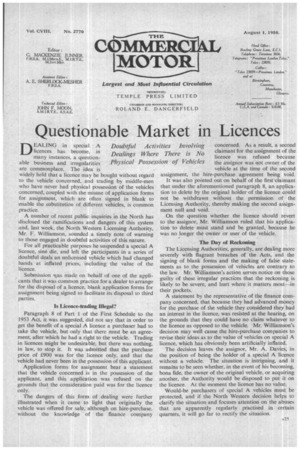Questionable Market in Licences
Page 27

If you've noticed an error in this article please click here to report it so we can fix it.
DEALING in special A licences has. become, in many instances, a questionable business and irregularities are commonplace. The idea is widely held that a licence May be bought without regard to the vehicle concerned, and trading by middle-men who have never had physical possession of the vehicles concerned, coupled with the misuse of application forms for assignment, which are often signed in blank to enable the substitution of different vehicles, is common practice.
A number of recent public inquiries in the North has disclosed the ramiflea.tions and dangers of this system and, last week, the North Western Licensing Authority, Mr. F. Williamson, sounded a timely note of warning to those engaged in doubtful activities of this nature.
For all practicable purposes he suspended a special A licence, sine die, and left the participants in a series of doubtful deals an unlicensed vehicle which had changed hands at inflated prices, including the value of the licence.
Submission was made on behalf of one of the applicants that it was common practice for a dealer to arrange for the disposal of a licence, blank application forms for assignment being signed to facilitate its disposal to third parties.
Is Licence-trading Illegal?
Paragraph 8 of Part 1 of the First Schedule to the 1953 Act, it was suggested, did not say that in order to get the benefit of a special A licence a purchaser had to take the vehicle, but only that there must be an agreement, after which he had a right to the vehicle. Trading in licences might be undesirable, but there was nothing, in law, to stop it_ It was admitted that the purchase price of £900 was for the licence only, and that the vehicle had never been in the possession of this applicant.
Application forms for assignment bear a statement that the vehicle concerned is in the possession of the applicant, and this application was refused on the grounds that the consideration paid was for the licence only.
The dangers of this form of dealing were further illustrated when it came to light that originally the vehicle was offered for sale, although on hire-purchase, without the knowledge of the finance company concerned. As a result, a second claimant for the assignment of the licence was refused because the assignor was not owner of the vehicle at the time of the second assignment, the hire-purchase agreement being void.
It was also pointed out on behalf of the first claimant that under the aforementioned paragraph 8, an application to delete by the original holder of the licence could not be withdrawn , without the permission of the Licensing Authority, thereby making the second as'signment null and void.
On the question whether the licence should revert to the assignor, Mr. Williamson ruled that his application to delete must stand and be granted, because he was no longer the owner or user of the vehicle.
The Day of Reckoning The Licensing Authorities, generally, are dealing more severely with flagrant breaches of the Acts, and the signing of blank forms and the making of false statements as to the possession of vehicles are contrary to the law. Mr. Williamson's actiOn serves notice on those guilty of these irregular practiees that the reckoning islikely to be severe, and hurt where it matters most—in their pockets.
A statement by the representative of the finance company concerned, that because they had advanced money for the purchase of the vehicle they considered they had an interest in the licence, was resisted at the hearing, on the grounds that they could have no claim whatever to the licence as opposed to the vehicle. Mr. Williamson's decision may well cause the hire-purchase companies to revise their ideas as to the value of vehicles on special A licence, which has obviously been artificially inflated.
The decision leaves the assignor,' Mr. A. Davies, in the position of being the holder of a special A licence without a vehicle. The situation is intriguing, and it remains to be seen whether, in the event of his becoming, bona fide, the owner of the original vehicle, or acquiring another, the Authority would be disposed to put it on the licence. At the moment the licence has DO value.
Would-be purchasers of special A vehicles must be protected, and if the North Western decision helps to clarify the situation and focuses attention on the abuses that are apparently regularly practised in certain quarters, it will go far to rectify the situation. A2.5
































































































